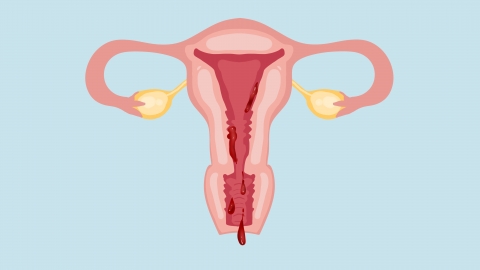What causes uterine bleeding?
Generally, uterine bleeding may be caused by menstruation, ovulation bleeding, dysfunctional uterine bleeding, endometritis, uterine fibroids, and other factors. It is recommended to seek timely medical consultation to determine the exact cause and receive appropriate treatment under a doctor's guidance. Detailed analysis is as follows:

1. Menstruation: After entering puberty, females undergo cyclical ovulation by the ovaries, which causes periodic shedding of the endometrium, forming menstruation, and表现为 regular uterine bleeding. This is a normal physiological phenomenon that does not require special treatment. During menstruation, it is important to stay warm, avoid strenuous exercise, change sanitary products frequently, and maintain external genital hygiene.
2. Ovulation bleeding: During ovulation, a temporary drop in estrogen levels may cause slight shedding of the endometrium, resulting in light uterine bleeding, which typically lasts 1–3 days. No special treatment is required, but adequate rest, avoiding fatigue, maintaining external genital hygiene, changing underwear frequently, and avoiding sexual intercourse to prevent infection are recommended.
3. Dysfunctional uterine bleeding: Endocrine disorders lead to abnormal ovarian function, such as lack of normal ovulation or irregular ovulation. The endometrium sheds and bleeds due to unopposed estrogen stimulation, accompanied by prolonged menstrual periods and increased menstrual flow. Patients may follow medical advice to use hormonal medications such as dydrogesterone tablets, ethinylestradiol cyproterone acetate tablets, or progesterone capsules to regulate hormone levels and restore a normal menstrual cycle.
4. Endometritis: Infection of the endometrium by pathogens such as bacteria causes inflammation. The inflammatory irritation leads to endometrial congestion and edema, resulting in irregular uterine bleeding, accompanied by lower abdominal pain and increased vaginal discharge. Patients should follow medical advice to take anti-infective medications such as cefixime dispersible tablets, levofloxacin hydrochloride capsules, or metronidazole tablets.
5. Uterine fibroids: Abnormal proliferation of uterine smooth muscle cells forms fibroids. These fibroids can compress or affect the endometrial blood vessels, causing uterine bleeding, accompanied by increased menstrual flow and prolonged menstrual periods. If the fibroid is small, regular observation is recommended; if symptoms are significant, patients should follow medical advice to undergo hysteroscopic myomectomy to remove the fibroid and alleviate the bleeding symptoms.
In daily life, maintaining a regular routine, avoiding excessive fatigue, eating a balanced diet, and reducing intake of spicy and irritating foods are important. Practicing good personal hygiene, avoiding unclean sexual practices, and undergoing regular gynecological examinations can help detect and manage uterine issues promptly, promoting reproductive health.





